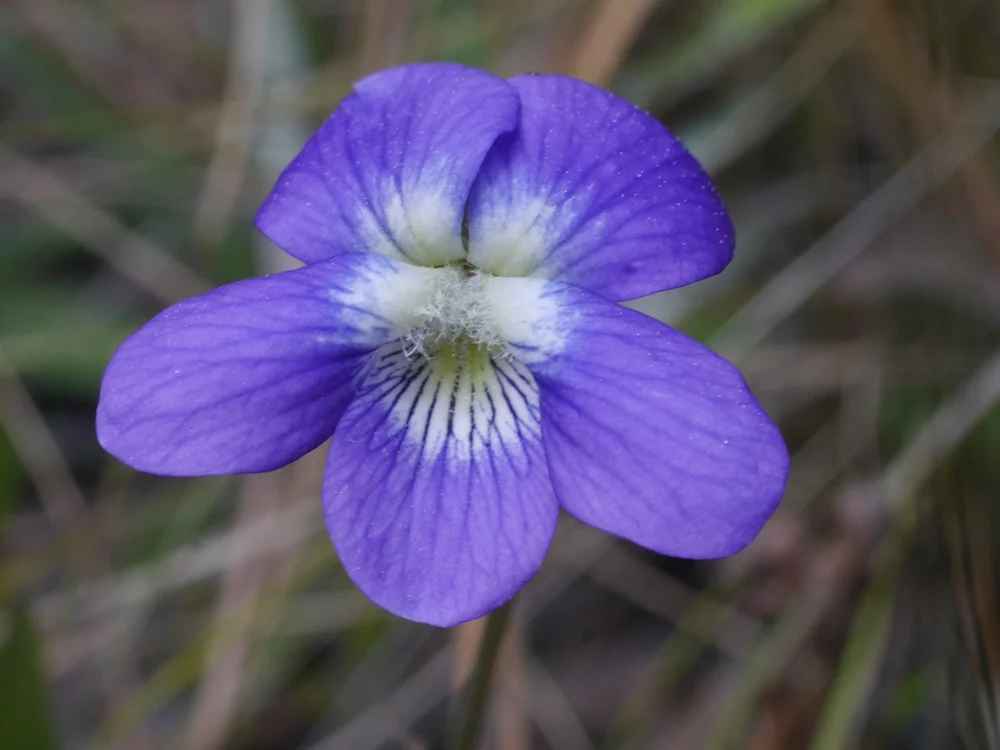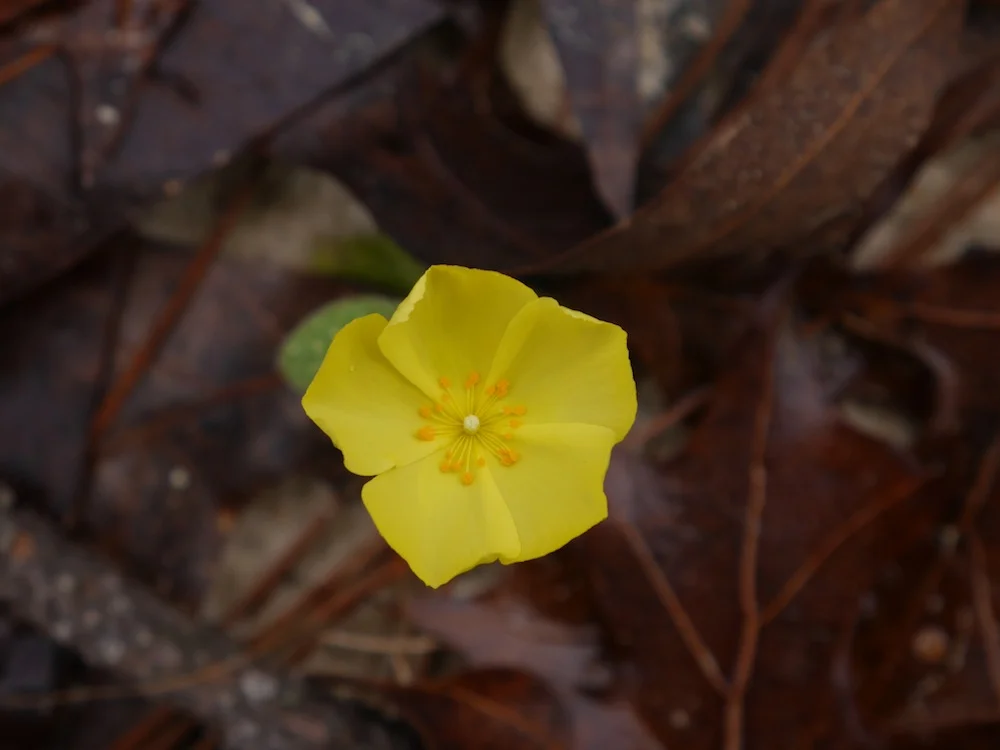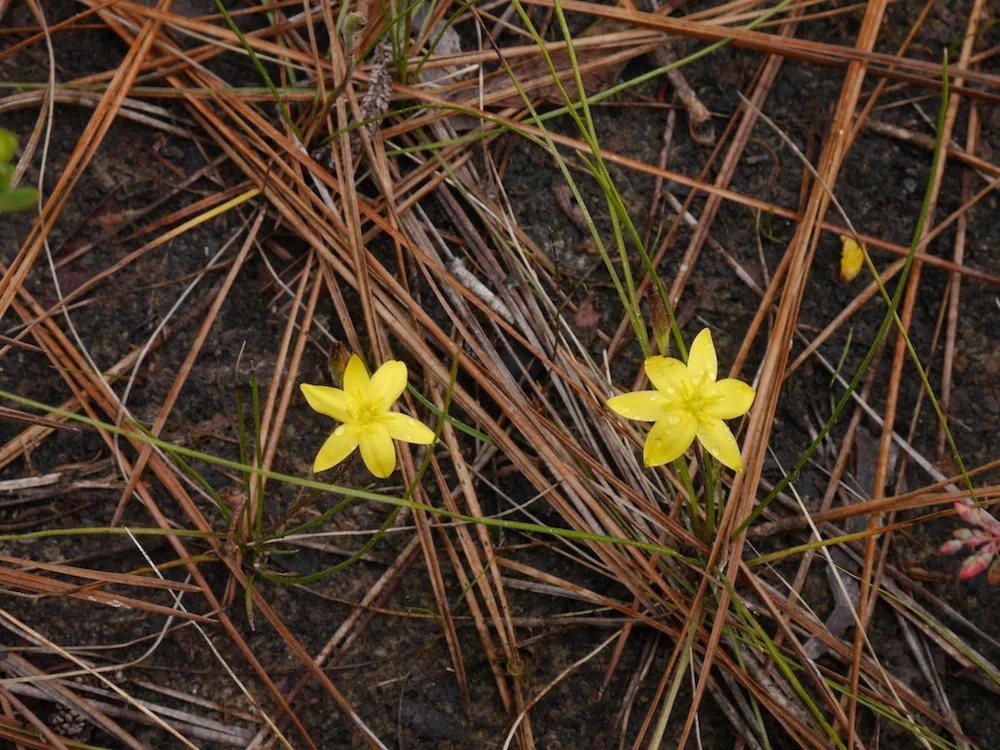Something happens in Florida every year around April. For the past six months, the mosquitoes haven't been buzzing. The night after a rain, the temperatures drop and bring a bright blue, high pressure tomorrow. The air is clear and sharp, and if you did happen to sweat from extreme exertion, the moisture would evaporate off your skin to be enveloped by crisp atmosphere.
All that changes in April.
The bugs awake from their dormancy, thrilled to find steamy temperatures and tropical puddles of water to reproduce in from the daily afternoon thunderstorms. And sweat? The air sweats. There's no more room for it to absorb your excess moisture when humidity is at 100%.
What I mean to say is, you better get your last camping trip in before April comes. So off to the Apalachicola National Forest!
The Apalachicola National Forest looms as a huge swath of green on maps of Tallahassee, sprawling over almost 572,000 acres. Even though I grew up with the forest right next door, I really had no idea what it was like apart from driving through it on the way to the beach. All you see is pine and pine and pine, but obviously the car view isn't going to show you anything. The infamous Tate's Hell forest resides in this region, and locals from the tiny, secluded town of Sumatra have a lively tale to go with the colorful name. According to legend, Tate went on the hunt for a panther that had been picking off livestock in his pioneer village. He took only his dogs, his gun and his knife. Under the cover of stars, the dogs picked up the scent of the panther, and ran after it, baying loudly. The howls turned to screams, and Tate knew his dogs were dead and that he was lost. The next morning, a heavy fog settled over the forest and Tate had no guidance of how to get home. He rested with his back against a pine tree, and he didn't even notice the big old rattler until it sank its fangs into his knee. Poor Tate dragged his blackened leg through the forest for a week till he finally reached the coast eight miles away.
“When Tate was discovered
These words he did tell,
”My name is Old Tate, boys,
I’ve just been in hell!”
These few spoken words
Were the last that he said;
His spirit it left him,
Old Tate was dead. ”
They say there are still a few panthers left in the Apalachicola National Forest.
A section of the Florida Trail cuts through the forest, and I figured it would be easy to just pick a 15 mile section and go hiking for a couple of days. I chose a section called Bradwell Bay. I was sold on it after it was described as 24,000 acres in the middle of nowhere, with pitcher plant savannahs and virgin pine stands that the loggers could never reach. The St. Joe Paper Company, along with multitudes of other forest-wrecking activities wiped out the old growth longleaf pine forests. Today, the longleaf pines are spindly and young, which is one of the reasons why the Red-cockaded woodpecker is endangered-- they only nest in longleaf pine trees that are at least 60 years old. They create cavities in the heart wood, accessible by multiple entrance holes. Massive habitat destruction has had a huge toll on the species: only 1% of the original population survives.
Apparently, I was so stoked on the remote possibility of seeing two extremely endangered animals AND carnivorous plants in Bradwell Bay that I just stopped reading the hiking description after that. Travis called asking me where we were going to sleep seeing as "bay" really just means swamp in this context, and in rainy times of the year you can expect to hike through waist-deep water on this section of the trail.
It had just rained 6 inches a few days before our trip. Oops!
So Travis picked another section in the Northwest corner of the forest, just South of Bristol, FL. It was supposedly drier than the the Bradwell Bay section. So on a beautiful Saturday afternoon, we reached the trail head for Camel Lake Loop, loaded up our packs and started off to see what treasures were hidden in this section of forest.
Okay! So the Northwest section of the forest isn't totally dry! Travis' Hiking Optimism came on full force. Yes, we'll have to plunge on in and just get our shoes wet, but weren't you getting a little hot anyway? This will SURELY cool you off.
Soooooooooo really what's going on here is that the trail makers decided to forge on ahead right through a Tupelo swamp. Let me tell you, it took fighting off every instinct I had to walk through opaque brown water through a bonafide wilderness swamp. With no snake boots. In shorts. Travis' Dangerous Wildlife Optimism now emerged as he asked me whether I ever heard of anyone getting bit by a water moccasin or other swamp creatures. I guess not. We continued along the "trail".
The swamp opened up to a pine savannah, but this was a wetland savannah so every step was spongy and moist. Golden grass grew up chest high, with towering longleaf pines standing watch above us.
I'm not gonna sugar coat it. With the exception of a few extremely deep sections, the landscape was pretty consistent for the next three hours of hiking. Savannah, swamp, savannah, deeper swamp.
But you know what that means? You stop and notice the little things that stand out. It is spring after all, and the little swamp flowers sure let you know it.
Around 3pm we finally reached Camel Lake, a dry, developed recreation area with some swimmers enjoying a Sunday dip. I took off my sopping boots.
Then I went ahead and took off the rest of my clothes and laid out on my camping towel to bake out the swamp water. A few minutes snooze turned into an hour, and before I knew it, it was time to put on a fresh pair of socks and get hiking to find a secluded spot further down the trail, far away from the RVs, squealing children and yelping dogs.
We pulled off the trail at 6:30 to start setting up camp. And we discovered that Travis had made a pretty epic mistake. Now I've made epic mistakes. I have neglected to reserve our campsite, and come to find that it's full. I have neglected to check the weather before the weekend, only to discover freezing nighttime temperatures were forecast.
Travis neglected to bring the tent poles.
Well what choice did we have really? Travis' Camping Optimism proclaimed that we would just set up a "ground tent", so we laid down the footprint, then unrolled our sleeping pads and thanked the Baby Jesus that it was March. Barely any mosquitoes. No rain. No frost. No big deal. However, I started taking inventory and made a list of everything we need to bring camping with us FROM NOW ON.
Like sporks. Sporks are really great so you don't have to eat your dinner with Swiss chard stems. Next time, I'll definitely remember to bring sporks.
We settled into the evening, and I built a little fire and relaxed, grateful to be sitting down after the day's slogging.
We awoke to a forest shrouded in mist. After breakfast we got going quickly, considering there was no tent to pack up. Wah wah. The day's hike was finishing the loop that would take us back to the car.
So here's the point in the hike that makes it worth it. As we backtracked our way toward the trail head, we saw them growing on the side of the soggy trail: the elusive carnivorous pitcher plants.
There are six species of native insectivorous pitcher plants in Florida, all of them belonging to the species Sarracenia. They grow in nitrogen-poor, acidic, and seasonally flooded soil. They emit strong odors to entice insects down their slender, tubular leaves, where a deadly pool of water awaits. The insects are trapped, and they subsequently drown and their bodies are digested to nourish the plant. We also saw Sundews, which are also insectivorous. They also smell great to bugs, and appear to be covered in hair bejeweled in dew droplets. The dew is actually a sticky trap, and the insects are digested through the leaf surface. COOL.
In the end, this trip was exhausting but satisfying. My legs didn't really work after three more hours of hiking through water, and now I know why I don't hear about a lot of people camping in this forest. Some good definitely came out of it-- like creating a camp inventory, and making a list of backpacking gear that we need to replace. But it was a pretty great way to finish out Spring on a good note. You know what this means, right?
The rest of our trips from here on out are gonna involve water. Like on purpose. CAN'T WAIT.








































